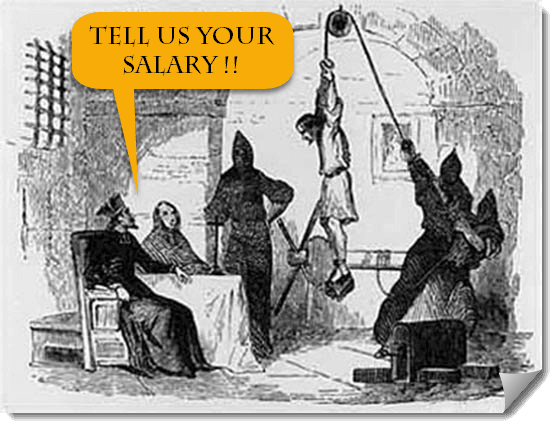In the October 30, 2018 Ask The Headhunter Newsletter a reader recounts her experience with a small-business owner and how he plays games with job offers.
Question
 I just came across some of your articles when trying to research my job offer being rescinded (Behind the scenes of a rescinded job offer, Job offer rescinded after I quit my job). A lot of what you wrote resonated with me and made me feel much better about my experience today.
I just came across some of your articles when trying to research my job offer being rescinded (Behind the scenes of a rescinded job offer, Job offer rescinded after I quit my job). A lot of what you wrote resonated with me and made me feel much better about my experience today.
I interviewed for a high level position at a smaller company, so I was talking to the owner directly. Here are the key facts about the compensation:
- The offer was at the bottom of the salary range discussed during my interview process.
- The owner said I could make it up with a large bonus, but that they didn’t have a structure for how bonuses worked. If the company was doing well I’d get all or part of the bonus, but it was at his discretion.
- I asked if he was flexible on the base pay at all, and I brought up the industry average (which was a lot higher) and my experience level and what I could bring to the table.
- He first said he was flexible on the base pay and even said that what he was paying me didn’t matter to him, but he didn’t actually budge and said this was a good offer he was making me.
- He said I needed to trust that I would be getting the bonus and at the end of the day my pay would be much higher.
I said I was still very interested and excited about the role. I explained that I would really like to review the details of the whole package, including the benefits, in case I had any questions. It’s a small company and there were some non-standard things they were doing with benefits, like providing some kind of stipend for your cell phone and other things, but no 401(k).
Here’s how that discussion went:
- I asked if he could send the complete offer in writing so that I go over all of it to make sure I understood everything, and then confirm my positive response.
- He asked how long I needed to review it.
- I asked if I could get it to him before Friday (this was on a Tuesday).
- He sounded disappointed. He said that wasn’t the response he was expecting but he would still send over the offer in writing.
- He said he had other candidates that he needed to inform who weren’t getting the job and it was not fair to them to make them wait 2-3 days until he got a confirmation from me.
- I asked him if he had a timeline in mind that would work better for him, so he said Thursday morning.
- I said okay.
That evening, I got an e-mail saying he was rescinding the offer. He said he wanted someone who was so excited about joining his company that they are prepared and anxious to accept the offer when it’s made verbally.
He said that he felt I lacked passion for his company and that he didn’t want anyone there who was not passionate about his brand.
I wrote him back a professional response thanking him for everything.
I felt very validated when I found your articles because you explain that employers often make verbal offers because they are merely fishing for a reaction, not actually making a bona fide offer. That’s exactly what this was.
The job is an analytical one, so I was surprised that they would expect an instant, seat-of-the-pants response when they were looking for a detail-oriented, analytical person!
When I told my friends what happened, they fell into two camps. All my friends who work at various levels in corporate environments (including HR) thought I did nothing wrong. Two of my friends who both own small companies agreed with the owner and said they, too, would have rescinded the offer because they felt it was insulting to not immediately accept the verbal offer. They said that asking for the offer in writing showed I lacked trust. This of course goes against everything I know and believe.
I see what happened as a red flag for how I may be treated in the future. I’m at a bad job now but I don’t want to go to another bad job. I’m interested in this divide between large companies and small business owners, and I thought you would be, too.
Are the negotiating rules really different for small companies versus larger ones? Or are the small business owners I’ve described just outliers? Thanks for your comments.
Nick’s Reply
I think you dodged a bullet. Your story is important because it highlights a raft of games employers play with job offers.
Are these problems particular to small companies? While I can’t offer data to support this, my experience suggests small business owners are far more likely to play these games than managers in larger companies. I think business owners tend to be far more autocratic than their peers in companies that have many owners or investors.
Strike One
Let’s look at the facts you presented above — #6 through #9. This business owner decided to extend an offer after you satisfactorily negotiated a more-than-reasonable decision deadline. He made a verbal agreement with you about the deadline. Then he reneged on what he agreed to.
That’s strike one against him. It tells us he can’t be trusted.
Strike Two
You prudently asked for details of the offer in writing. He hedged, then agreed. Then he reneged and never provided anything in writing. I think he never had any intention of giving you a written offer.
This is different from merely agreeing to a decision timeline. This is about reneging on putting terms in writing. Do you think he does business deals on a simple handshake, without anything in writing? That’s a rhetorical question but, of course, he may in fact do deals with nothing in writing.
Either way, that’s strike two.
Strike Three
After tactful questions from you about the salary and bonus structure (#1 – #5), he refused to commit to anything concrete. He wants you to trust him, but he doesn’t trust you. He uses a double standard.
The old rule about “trust but verify” is why we put agreements in writing. I’ll repeat: This guy had no intention of putting anything in writing. “Trust me” means “No.”
Strike three.
Strike Four
The egregious management error this employer committed was to judge you unworthy because you failed to instantly display passion and a sucker’s excitement for an incomplete, dishonest job offer. He lost a potentially great hire.
If a strike four could be counted, that’s it.
If he wants to hire a foolish employee, he’s talking to the wrong person. If he’s looking for a thoughtless worker whose decision-making process is marked by a lack of prudence and due diligence, he should absolutely move on to another candidate he can lie to and hire on the spot.
The lessons from this game
It’s a good sign when an employer engages in a negotiation with a job applicant on compensation, on the terms of the job, and even on when a decision is due. It suggests you’ll be working for a boss who values your input and your circumspection, and who wants to make working together a win-win experience.
It’s a bad sign when an employer plays games.
You’ve taken the trouble to share your experience in very useful detail, revealing the many games employers play with job offers. This guy is bold enough to play them all at once — then to blame you for catching him.
Lies employers tell you about job offers
These are some of the lies employers tell, presented as a sort of “dictionary.” Here’s what unworthy employers will do in the hiring process:
- Salary Range. Establish a salary range to set ground rules for proceeding with interviews, then they pretend the low end is going to impress you.
- Good Offer. Tell you it’s a good offer without showing you exactly what the offer is.
- Competitive. Refer to “competitive” pay and benefits but never to precise sums or specific benefits.
- Bonus Structure. Refer to contingent forms of pay — like bonuses and commissions — but do not define objective, measurable, agreed-upon criteria that you must meet to earn those bonuses.
- Flexible. Say they are flexible on pay, but make no explicit compromises or concessions about pay.
- Industry Standard. Talk about industry-standard or average pay, but don’t define what that is or cite the sources of those numbers.
- Opportunity. Suggest that what this deal is really all about is a great opportunity for you, and that pay isn’t really the issue to them, when it clearly is because they won’t negotiate pay with you candidly.
- Trust. Tell you to trust them to pay you fairly, but will not define the compensation deal objectively in writing — or trust you to review their offer.
- Terms. Want you to agree to accept a job offer immediately based only on a few points — and “don’t worry about the rest of the details,” or what lawyers refer to as “terms.”
- Job Offer. Want you to commit to a deal verbally, while they balk about putting it in writing with their signature on it.
- Decision. Agree to give you two days to review a written offer they haven’t given you yet, then renege because you insulted them by not deciding instantly.
- Qualified. Judge how qualified you are for the job by whether you’re “excited” and “passionate” enough to accept on the spot.
- Commitment. Negotiate terms and make commitments then violate them.
These are all lies unworthy employers tell job applicants they try to take advantage of. The words in the little “dictionary” above actually mean something to good employers — and you’ll see that instantly in a good employer’s behavior.
Never work with jerks
You should never go to work for employers who play these job-offer games. You’d regret it because they’d behave the same way day-to-day. They’re jerks.
I think you’ve identified at least three people you should never work with — including your friends who said you insulted the employer and displayed a lack of trust. Don’t doubt your judgement – it has certainly served you well here.
Whether you’re talking to a big or small company, the approach and questions you relied on here will tell you all you need to know about an employer.
From the details you shared, I see a prudent, honest, forthright, responsible professional who treats others the way she wishes to be treated. I see no fault in anything you said or did during the hiring process. In fact, I compliment you for doing everything right – it all combined to help you dodge a bullet.
On to the next! Find a company that deserves a good hire.
My only suggestion is to carefully check a company’s and manager’s references before you invest your time interviewing there. You might find this useful: 5 rules to test for the best job opportunities.
What lies have you heard employers tell job applicants? What would you add to the dictionary above? What else should job seekers look out for in the throes of getting a job offer? What details do you insist on having in a written job offer?
: :




 Only if money is your prime motivator. If it is, go for it. Of course, without any other information, I can’t really give you very thoughtful advice. But in general, this is a scenario that people sometimes face, so let’s deal with it generally.
Only if money is your prime motivator. If it is, go for it. Of course, without any other information, I can’t really give you very thoughtful advice. But in general, this is a scenario that people sometimes face, so let’s deal with it generally. I’m a Senior Data Scientist and I just got a job offer, but the salary is about $1,000 lower than I expected. It’s a management position with less than a dozen staff reporting to me. They also offered a very generous signing bonus of about $50,000.
I’m a Senior Data Scientist and I just got a job offer, but the salary is about $1,000 lower than I expected. It’s a management position with less than a dozen staff reporting to me. They also offered a very generous signing bonus of about $50,000. I just came across some of your articles when trying to research my job offer being rescinded (
I just came across some of your articles when trying to research my job offer being rescinded ( Next month I’ll have my three-year performance evaluation, and I feel that I am worth more than my current salary. How do I convey the message that my job is worth more and ask for more money?
Next month I’ll have my three-year performance evaluation, and I feel that I am worth more than my current salary. How do I convey the message that my job is worth more and ask for more money? I know you don’t like Glassdoor’s salary survey data and employer reviews, but what are we supposed to use to base our salary negotiations on? I’m talking about job seekers.
I know you don’t like Glassdoor’s salary survey data and employer reviews, but what are we supposed to use to base our salary negotiations on? I’m talking about job seekers. Thanks for asking. My purpose behind this week’s column is revealed in the title. When we get to the end of it, I’m going to ask everyone to complete that sentence: “We need to know your salary because — .”
Thanks for asking. My purpose behind this week’s column is revealed in the title. When we get to the end of it, I’m going to ask everyone to complete that sentence: “We need to know your salary because — .” I’ve read your many columns about how to negotiate salary, how much to ask for when applying for a new job, what not to say about my salary history, and about why salary surveys (and websites) aren’t to be relied on. Now I’m doing some introspecting, trying to look at the big picture of my value and what I’m worth in the world. I wish I had started thinking about this 15 years ago.
I’ve read your many columns about how to negotiate salary, how much to ask for when applying for a new job, what not to say about my salary history, and about why salary surveys (and websites) aren’t to be relied on. Now I’m doing some introspecting, trying to look at the big picture of my value and what I’m worth in the world. I wish I had started thinking about this 15 years ago. Job hunting has become incredibly frustrating. I have always said HR should never screen candidates, but it is reality and I have to face it. I am looking for a job and can’t get past the initial screening. People hiring for jobs I have done won’t talk to me. I just started using Jobscan to try to get through the initial screening. The word-match is ridiculous, but again it is reality.
Job hunting has become incredibly frustrating. I have always said HR should never screen candidates, but it is reality and I have to face it. I am looking for a job and can’t get past the initial screening. People hiring for jobs I have done won’t talk to me. I just started using Jobscan to try to get through the initial screening. The word-match is ridiculous, but again it is reality. You’ve probably already read this on Slate. Three economists conducted a study that asks,
You’ve probably already read this on Slate. Three economists conducted a study that asks,